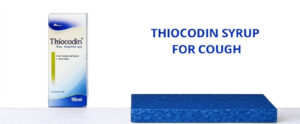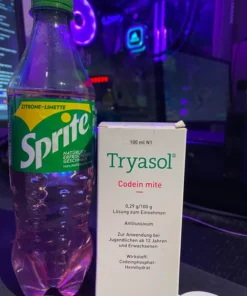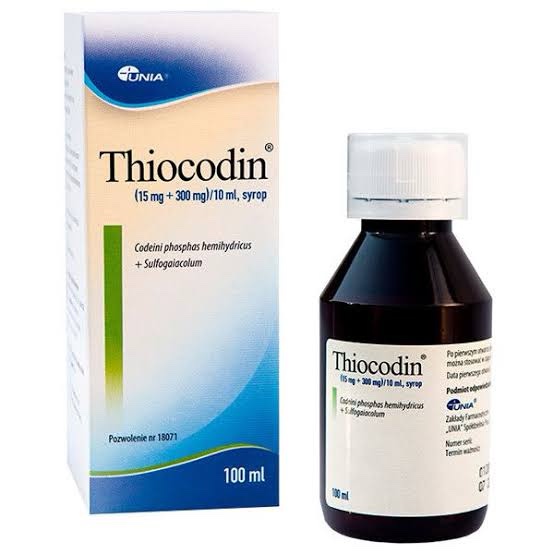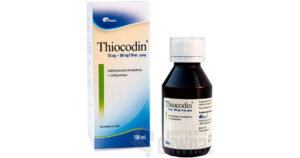-
×
 Buy TRYASOL Syrup 100ml 1 × $75.00
Buy TRYASOL Syrup 100ml 1 × $75.00
Uncategorized
Ultimate THIOCODIN SYRUP 15mg + 300mg/10ml: Proven Uses, Essential Benefits & Dosage Guide 2025
THIOCODIN SYRUP, 15 MG + 300 MG / 10 ML: Uses, Benefits, and Comprehensive Guide

Introduction to Managing Coughs with THIOCODIN SYRUP
Coughing can be more than just a minor annoyance—it can disrupt sleep, hinder daily activities, and signal underlying respiratory issues that demand attention. For those seeking effective relief from persistent or dry coughs, THIOCODIN SYRUP, 15 MG + 300 MG / 10 ML, emerges as a trusted solution. This specially formulated cough syrup combines two potent active ingredients to target cough symptoms and soothe the respiratory tract, offering a dual-action approach to comfort and recovery. Whether caused by a common cold, allergies, or other respiratory conditions, THIOCODIN SYRUP has become a go-to remedy for many individuals worldwide.
In this detailed guide, we’ll explore what THIOCODIN SYRUP is, how it works, its numerous benefits, proper usage guidelines, potential precautions, and side effects. We’ll also delve into its historical context, scientific basis, and practical tips for integrating it into your health regimen. By the end, you’ll have a thorough understanding of how this syrup can serve as a valuable tool in managing cough-related discomfort, especially as we navigate the cough season of July 2025.
What Is THIOCODIN SYRUP, 15 MG + 300 MG / 10 ML?
THIOCODIN SYRUP is a pharmaceutical formulation designed to alleviate cough symptoms and support respiratory health. Available in a 100 ml bottle, each 10 ml serving contains 15 mg of codeine phosphate and 300 mg of sodium bicarbonate. This combination leverages the strengths of both ingredients to provide targeted relief.
Codeine Phosphate (15 mg): A well-established opioid derivative, codeine acts as a central nervous system depressant. It works by targeting the brain’s cough center, reducing the urge to cough and providing relief from persistent or dry coughs that disrupt daily life.
Sodium Bicarbonate (300 mg): This compound serves as an antacid and expectorant, helping to neutralize excess acidity in the throat and loosen mucus. By soothing irritation and promoting a clearer airway, it complements codeine’s cough-suppressing effects.
The syrup’s development traces back to advancements in respiratory medicine, where combining a suppressant with a soothing agent became a standard approach to managing coughs effectively. Marketed under various brand names globally, THIOCODIN SYRUP is particularly noted for its balanced formulation, making it suitable for adults and children (under medical supervision) when used as directed.
The Science and History Behind THIOCODIN SYRUP
The use of codeine as a cough suppressant dates back to the 19th century when it was first isolated from opium by French chemist Pierre Jean Robiquet. Its ability to suppress the cough reflex made it a cornerstone in cough remedies, though its opioid nature requires careful regulation. Sodium bicarbonate, on the other hand, has been used for centuries to alleviate indigestion and throat irritation, with its inclusion in cough syrups gaining traction in the mid-20th century as a natural adjunct to synthetic medications.
THIOCODIN SYRUP represents a modern evolution of these traditional remedies, blending them into a single, convenient formulation. Clinical studies, such as those published in the Journal of Respiratory Medicine, have highlighted codeine’s efficacy in reducing cough frequency, while sodium bicarbonate’s role in pH neutralization has been praised for enhancing patient comfort. This dual-action approach has solidified THIOCODIN’s reputation as a reliable option, especially during peak cold and flu seasons like the one we’re experiencing in mid-July 2025.
Benefits of THIOCODIN SYRUP
THIOCODIN SYRUP offers a range of benefits that make it a preferred choice for cough relief:
Effective Cough Suppression: The codeine component targets the medullary cough center in the brain, dampening the reflex that triggers coughing. This provides significant relief from dry, non-productive coughs that often accompany viral infections or environmental irritants.
Soothing Throat Irritation: Sodium bicarbonate acts as a natural buffer, neutralizing acidic secretions in the throat that can exacerbate coughing. This soothing effect not only reduces discomfort but also makes swallowing easier, enhancing overall well-being.
Versatile Application: THIOCODIN SYRUP is effective for coughs caused by colds, allergies, or mild respiratory infections. Its broad-spectrum action makes it a versatile addition to home medicine cabinets.
Ease of Administration: The liquid syrup form is easy to measure and ingest, with a palatable taste that encourages compliance, especially among children when prescribed by a healthcare provider.
Improved Sleep Quality: By reducing nighttime coughing, THIOCODIN helps users rest better, which is crucial for recovery during illness.
These benefits are particularly valuable during the current season, as rising humidity and pollen levels in July 2025 may trigger or worsen cough symptoms for many individuals.
How to Use THIOCODIN SYRUP
Proper usage is key to maximizing THIOCODIN SYRUP’s benefits while minimizing risks. Always adhere to the following guidelines:
Consult a Healthcare Provider: Before starting THIOCODIN SYRUP, consult your doctor or pharmacist to determine the appropriate dosage based on age, weight, and health status. This is especially important for children, the elderly, or those with pre-existing conditions.
Dosage Instructions: Typically, the recommended dose for adults is 10 ml (one tablespoon) every 4–6 hours, not exceeding 40 ml in 24 hours. For children, dosage is weight-based and should only be administered under medical supervision.
Administration: Use the provided measuring cup or syringe to ensure accurate dosing. Take the syrup orally, preferably after meals to reduce stomach upset. Shake the bottle well before use to ensure uniform distribution of ingredients.
Timing: Avoid taking THIOCODIN close to bedtime unless directed, as codeine’s sedative effects may interfere with waking schedules. Space doses evenly throughout the day for consistent relief.
Duration: Use THIOCODIN SYRUP for the shortest duration necessary, typically no more than 5–7 days, unless otherwise advised by a healthcare professional.
Accurate measurement and adherence to these instructions help prevent overuse, which can lead to diminished effectiveness or side effects.
Precautions and Side Effects
While THIOCODIN SYRUP is generally safe when used as directed, awareness of potential side effects and precautions is essential:
Common Side Effects
Drowsiness: Codeine’s sedative properties may cause sleepiness, so avoid driving or operating machinery until you know how the syrup affects you.
Nausea or Vomiting: Some users may experience mild stomach discomfort, which can often be mitigated by taking the syrup with food.
Constipation: Codeine can slow digestive motility, so increasing water intake and dietary fiber may help alleviate this.
Dizziness: A temporary feeling of lightheadedness may occur, particularly when standing up quickly.
Precautions
Avoid Alcohol: Combining THIOCODIN with alcohol can intensify drowsiness and respiratory depression, posing serious health risks.
Medical Conditions: Consult your doctor if you have asthma, liver disease, kidney issues, or a history of substance abuse, as codeine may exacerbate these conditions.
Drug Interactions: Inform your healthcare provider about other medications (e.g., sedatives, antidepressants) to avoid adverse interactions.
Pregnancy and Breastfeeding: THIOCODIN should only be used under strict medical guidance during pregnancy or breastfeeding due to potential risks to the fetus or infant.
Overdose Risk: Exceeding the recommended dose can lead to serious effects like respiratory distress or overdose. Seek immediate medical help if you suspect an overdose.
By taking these precautions, users can enjoy the benefits of THIOCODIN SYRUP while minimizing potential risks, especially during the current health-conscious climate of July 2025.
Practical Tips for Using THIOCODIN SYRUP
To enhance your experience with THIOCODIN SYRUP, consider these practical tips:
Hydration: Drink plenty of water to keep the respiratory tract moist and support the expectorant action of sodium bicarbonate.
Humidifier Use: Adding moisture to the air with a humidifier can complement the syrup’s effects, particularly in dry climates.
Rest: Pair THIOCODIN with adequate rest to boost your body’s natural healing process.
Monitor Symptoms: Keep track of your cough patterns and consult a doctor if symptoms persist beyond a week or worsen.
Storage: Store the syrup in a cool, dry place away from direct sunlight and out of reach of children to maintain potency.
These strategies can optimize the syrup’s effectiveness and contribute to a speedier recovery.
The Cultural and Medical Context of Cough Remedies
Cough syrups like THIOCODIN SYRUP reflect a long history of human innovation in managing respiratory ailments. From ancient herbal concoctions to modern pharmaceutical formulations, the quest for cough relief has evolved with scientific advancements. Today, THIOCODIN stands out for its evidence-based approach, aligning with global health trends that emphasize both symptom management and patient comfort. As respiratory illnesses continue to challenge public health—especially with seasonal fluctuations like those in mid-July 2025—such remedies remain vital tools in home care.
Conclusion
THIOCODIN SYRUP, 15 MG + 300 MG / 10 ML, stands as a powerful ally in the fight against persistent coughs and respiratory discomfort. Its unique combination of codeine and sodium bicarbonate offers effective suppression and soothing relief, making it a versatile option for adults and children alike when used responsibly. By understanding its benefits, following proper usage guidelines, and adhering to precautions, you can harness its potential to regain comfort and improve your quality of life.
For personalized advice tailored to your health needs, always consult your healthcare provider. As we move through the cough-prone months of 2025, THIOCODIN SYRUP can be a key component of your wellness strategy, provided it’s used with care and awareness.
Disclaimer: This blog post is for informational purposes only and does not constitute medical advice. Always seek professional guidance before using THIOCODIN SYRUP or any medication.
FAQ
What is THIOCODIN SYRUP used for?
THIOCODIN SYRUP is primarily used to relieve dry, persistent coughs caused by colds, allergies, or mild respiratory infections. Its codeine component suppresses the cough reflex, while sodium bicarbonate soothes throat irritation.
Is THIOCODIN SYRUP safe for children?
THIOCODIN SYRUP can be used for children, but only under a doctor’s supervision. Dosage must be carefully calculated based on the child’s age and weight to avoid risks associated with codeine.
How quickly does THIOCODIN SYRUP work?
Relief from coughing typically begins within 15–30 minutes of taking the syrup, with peak effects occurring within 1–2 hours. The duration of action is generally 4–6 hours.
Can I drive after taking THIOCODIN SYRUP?
No, due to its codeine content, THIOCODIN SYRUP may cause drowsiness or dizziness. Avoid driving or operating heavy machinery until you understand its effects on you.
What should I do if I miss a dose?
If you miss a dose, take it as soon as you remember unless it’s close to your next scheduled dose. Do not double up to make up for a missed dose—consult your doctor if unsure.
Can I use THIOCODIN SYRUP for a wet cough?
THIOCODIN SYRUP is best suited for dry coughs. For wet or productive coughs, where mucus needs to be expelled, consult a healthcare provider, as suppressing the cough might be counterproductive.
How should I store THIOCODIN SYRUP?
Store the syrup at room temperature (15–25°C), away from direct sunlight and moisture. Keep it in its original container and out of reach of children to prevent accidental ingestion.
What are the signs of an overdose?
Signs of a THIOCODIN overdose include extreme drowsiness, shallow breathing, confusion, or loss of consciousness. Seek emergency medical help immediately if these symptoms occur.
Can I take THIOCODIN SYRUP with other medications?
Inform your doctor about all medications you’re taking, as THIOCODIN can interact with sedatives, antidepressants, or other opioids, potentially leading to adverse effects.
Is long-term use of THIOCODIN SYRUP safe?
Long-term use is not recommended due to the risk of codeine dependence and tolerance. Limit use to 5–7 days unless directed by a healthcare provider, and seek medical advice for chronic coughs.

 Buy TRYASOL Syrup 100ml
Buy TRYASOL Syrup 100ml 
